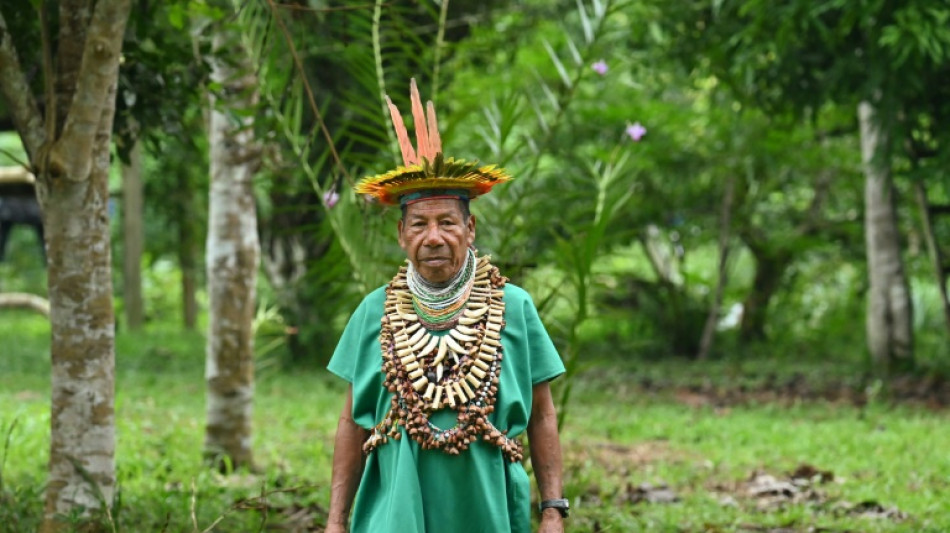
-
 Scotland spoil Italy's T20 World Cup debut with big win
Scotland spoil Italy's T20 World Cup debut with big win
-
Israeli president says 'we will overcome evil' at Bondi Beach

-
 Munsey leads Scotland to 207-4 against Italy at T20 World Cup
Munsey leads Scotland to 207-4 against Italy at T20 World Cup
-
Japan restarts world's biggest nuclear plant again

-
 Bangladesh poll rivals rally on final day of campaign
Bangladesh poll rivals rally on final day of campaign
-
Third impeachment case filed against Philippine VP Duterte

-
 Wallaby winger Nawaqanitawase heads to Japan
Wallaby winger Nawaqanitawase heads to Japan
-
Thailand's Anutin rides wave of nationalism to election victory

-
 Venezuela's Machado says ally kidnapped by armed men after his release
Venezuela's Machado says ally kidnapped by armed men after his release
-
Maye longs for do-over as record Super Bowl bid ends in misery

-
 Seahawks' Walker rushes to Super Bowl MVP honors
Seahawks' Walker rushes to Super Bowl MVP honors
-
Darnold basks in 'special journey' to Super Bowl glory

-
 Japan's Takaichi may struggle to soothe voters and markets
Japan's Takaichi may struggle to soothe voters and markets
-
Seahawks soar to Super Bowl win over Patriots

-
 'Want to go home': Indonesian crew abandoned off Africa demand wages
'Want to go home': Indonesian crew abandoned off Africa demand wages
-
Asian stocks track Wall St rally as Tokyo hits record on Takaichi win

-
 Bad Bunny celebrates Puerto Rico in joyous Super Bowl halftime show
Bad Bunny celebrates Puerto Rico in joyous Super Bowl halftime show
-
Three prominent opposition figures released in Venezuela

-
 Israeli president says 'we shall overcome this evil' at Bondi Beach
Israeli president says 'we shall overcome this evil' at Bondi Beach
-
'Flood' of disinformation ahead of Bangladesh election

-
 Arguments to begin in key US social media addiction trial
Arguments to begin in key US social media addiction trial
-
Dr. Jonathan Spages Expands Diabetes Reversal Practice Across New States, Adds Clinical Team to Meet Growing Demand

-
 Agronomics Limited Announces Net Asset Value Calculation as at 31 December 2025
Agronomics Limited Announces Net Asset Value Calculation as at 31 December 2025
-
UK-Based Vesalic Limited Emerges from Stealth with Landmark Discovery of Potential Non-CNS Driver of Motor Neuron Diseases, including ALS, and Breakthrough Therapeutic and Diagnostic Opportunities

-
 Gotterup tops Matsuyama in playoff to win Phoenix Open
Gotterup tops Matsuyama in playoff to win Phoenix Open
-
New Zealand's Christchurch mosque killer appeals conviction

-
 Leonard's 41 leads Clippers over T-Wolves, Knicks cruise
Leonard's 41 leads Clippers over T-Wolves, Knicks cruise
-
Trump says China's Xi to visit US 'toward the end of the year'

-
 Real Madrid edge Valencia to stay on Barca's tail, Atletico slump
Real Madrid edge Valencia to stay on Barca's tail, Atletico slump
-
Malinin keeps USA golden in Olympic figure skating team event

-
 Lebanon building collapse toll rises to 9: civil defence
Lebanon building collapse toll rises to 9: civil defence
-
Real Madrid keep pressure on Barca with tight win at Valencia

-
 PSG trounce Marseille to move back top of Ligue 1
PSG trounce Marseille to move back top of Ligue 1
-
Hong Kong to sentence media mogul Jimmy Lai in national security trial

-
 Lillard will try to match record with third NBA 3-Point title
Lillard will try to match record with third NBA 3-Point title
-
Vonn breaks leg as crashes out in brutal end to Olympic dream

-
 Malinin enters the fray as Japan lead USA in Olympics team skating
Malinin enters the fray as Japan lead USA in Olympics team skating
-
Thailand's Anutin readies for coalition talks after election win

-
 Fans arrive for Patriots-Seahawks Super Bowl as politics swirl
Fans arrive for Patriots-Seahawks Super Bowl as politics swirl
-
'Send Help' repeats as N.America box office champ

-
 Japan close gap on USA in Winter Olympics team skating event
Japan close gap on USA in Winter Olympics team skating event
-
Liverpool improvement not reflected in results, says Slot

-
 Japan PM Takaichi basks in election triumph
Japan PM Takaichi basks in election triumph
-
Machado's close ally released in Venezuela

-
 Dimarco helps Inter to eight-point lead in Serie A
Dimarco helps Inter to eight-point lead in Serie A
-
Man City 'needed' to beat Liverpool to keep title race alive: Silva

-
 Czech snowboarder Maderova lands shock Olympic parallel giant slalom win
Czech snowboarder Maderova lands shock Olympic parallel giant slalom win
-
Man City fight back to end Anfield hoodoo and reel in Arsenal

-
 Diaz treble helps Bayern crush Hoffenheim and go six clear
Diaz treble helps Bayern crush Hoffenheim and go six clear
-
US astronaut to take her 3-year-old's cuddly rabbit into space


Envious shamans and pollution: Diverse threats to Ecuadoran Amazon
When fish numbers diminished in the Ecuadoran Amazon, the Siona Indigenous people blamed envious, rival shamans for blocking the animals' passage through the rivers of Cuyabeno, a biodiverse wetland.
Experts, however, point the finger at pollution, deforestation and climate change wreaking havoc on the second-largest protected area in Ecuador.
Shaman Rogelio Criollo, 74, told AFP the cause of the decline had been revealed to his Siona tribe during a divination ceremony using the sacred hallucinogen ayahuasca, also known as yage.
"A (rival) sage who knew the spirit of the jungle and the spirit of the river ... closed the doors to the fish, the turtles," Criollo told AFP.
But the shaman acknowledges that other factors may also be at play: "Many say it's pollution."
Stretching over some 600,000 hectares, the Cuyabeno lake system and the nearby Lagartococha and Yasuni reserves were in 2017 declared wetlands of international importance under the Ramsar environment treaty.
The area hosts more than 200 species of amphibians and reptiles, 600 types of bird and more than 160 mammal groups.
- 'Alerts for us' -
The risks to the forest oasis are plenty.
"Satellite data shows an extremely serious deforestation process" nearby, reserve director Luis Borbor told a recent conference in Quito on fishing.
The extent of farmland bordering on Cuyabeno rose from 819 hectares in 1985 to over 5,000 hectares in 2022, affecting the soil health and robbing countless species of a home in trees critical to absorbing planet-warming CO2.
Also nearby, illegal mines are polluting water sources upstream from Cuyabeno.
A study by Ecuador's National Biodiversity Institute in February revealed "heavy metals accumulation in fish" in several Amazonian rivers -- including the Aguarico and Cuyabeno that cross the reserve and are a source of food for indigenous peoples.
Experts also suspect the hand of global warming in droughts that are ever more frequent and severe.
Last year, the Laguna Grande -- Cuyabeno's biggest tourist attraction -- dried up twice. It is unusual for it to happen even once a season, said Borbor.
"These are alerts for us to say that there is climate change in this region," he told AFP.
Drought this year in Ecuador saw water levels drop to critical lows, resulting in power outages of up to 13 hours per day as hydroelectric reservoirs ran empty.
On Wednesday, the World Meteorological Organization said Latin America and the Caribbean had their warmest year on record in 2023 as a "double-whammy" of El Nino and climate change caused major weather calamities, including crippling droughts.
- Ancestral help -
As global efforts falter to curb climate change caused by mankind's burning of planet-warming fossil fuels, the Siona deal with their problems the traditional way.
Delio Payaguaje, 72, another Siona shaman, describes a ceremony he took part in to commune with the spirit world, seeking a solution to the fish shortage in Cuyabeno's 14 lagoons.
Dressed in necklaces with animal fangs and feathered headdresses, the shamans prayed to the forefathers, and then went to the river.
There, they saw movements and bubbles in the water, indicative of fish activity, said Payaguaje.
According to Borbor, Indigenous knowledge has been key to conserving Ecuador's nature reserves, which house everything from kingfishers, macaws and herons to monkeys and pink dolphins.
J.Williams--AMWN


